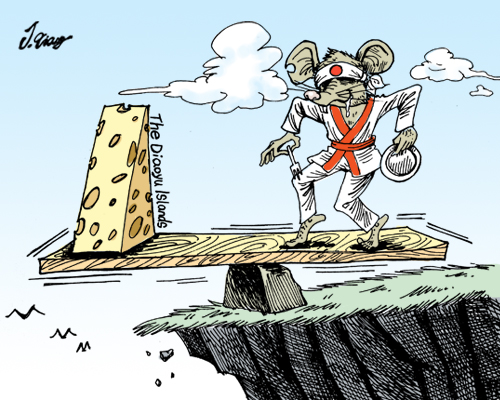The Diaoyu Islands and patriotism
- By Liu Weidong
 0 Comment(s)
0 Comment(s) Print
Print E-mail China.org.cn, August 26, 2012
E-mail China.org.cn, August 26, 2012
|
|
|
Of mice and menace [By Jia Qiang/China.org.cn] |
Anti-Japanese sentiment has continued to rise as the flames surrounding China and Japan's row over the Diaoyu Islands grow hotter and hotter. Last weekend, from Guangzhou to Harbin, people held demonstrations to protest Japanese right wing activists' landing on the Diaoyu Islands. Demonstrators called for a boycott on Japanese products, some threatened Japanese businessmen and some even smashed Japanese-brand cars owned by Chinese people.
How should we judge this behavior? First, the right to assemble is constitutional right of citizens. As long as we abide by the law, we can definitely voice our angers and opposition to Japan's arrest of the Hong Kong activists.
Second, anyone has the right to stop buying Japanese goods or destroy them publicly or call on others to follow the motion. But do not forget that other people also have the right to buy Japanese goods. Your rights should not infringe on the rights of others ― this is the basic rule of any modern civilized nation. No one has the right to force others to buy or not buy products ― it is the decision of the individual consumer whether or not to make purchasing decisions based on his or her political convictions.
Third, threatening Japanese businessmen is totally wrong. It's the actions of Japanese government, not its businessmen, which have hurt Chinese people's feelings. Their investment in China has nothing to do with the occupation of the Diaoyu Islands. If you threaten Japanese businessmen in China, it justifies Japanese threatening of Chinese people living in Japan. Menacing words expose nothing but paranoia and cowardice.
Fourth, smashing cars should be treated as a crime. Cars are only vehicles ― they do not have any political significance. Car owners don't believe buying Japanese cars supports the Japanese defense of the Diaoyu Islands ― they simply buy the car because they like it. If China was able to produce cheaper and more fuel-efficient cars, Japanese cars would undoubtedly shift out of the Chinese market.
Some would argue that I am being unpatriotic. But what on Earth is patriotism, exactly? Are hurling abuses, destroying goods and shouting slogans patriotic behaviors? Actually, patriotism is not a kind of spirit. It's an instinct. Loving one's motherland is like loving one's family. No country has elevated patriotism to the level of importance that China has. However, at the same time, the government has not clearly defined what it means to be patriotic. This is why some people behave improperly and damage national interests in name of patriotism.
Patriotism means to do one's bit to help build up a strong, prosperous, socially equal and culturally advanced country instead of shouting extreme slogans, smashing others' properties on the street or threatening those who do not threaten you. If you are a real patriot, you should continuously work hard for China's progress and to make her an ideal destination for immigrants instead of a country where many of her people wish to emigrate. When that happens, neighboring countries which have territorial disputes with China will rather be conquered by China's charm. At that point, none of them will have the power or the will to challenge China.
Respecting oneself starts from respecting others. We welcome criticism, but we should strongly condemn abuse.
This post was first published in Chinese and translated by Li Shen.
Opinion articles reflect the views of their authors, not necessarily those of China.org.cn.







Go to Forum >>0 Comment(s)